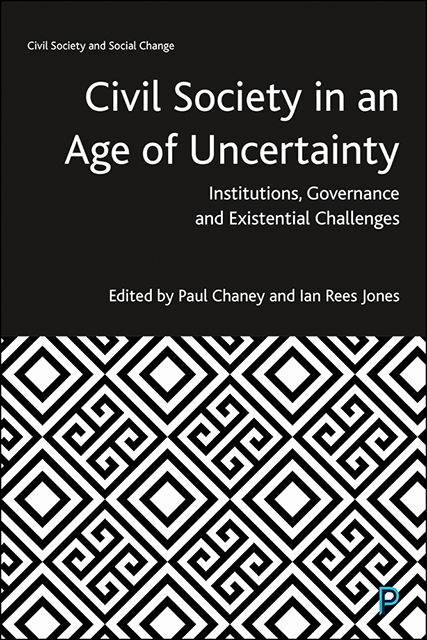Book contents
- Frontmatter
- Contents
- List of tables and figures
- Notes on contributors
- Acknowledgements
- 1 Introduction: Locating civil society
- 2 Existential challenges
- 3 Civil society and the governance of city region economic development
- 4 Civil society, pandemic and the crisis of welfare: exploring mixed economy models of welfare in domiciliary adult social care in a devolved UK
- 5 The contemporary threat to minority languages and cultures: civil society, young people and Celtic language use in Scotland and Wales
- 6 Digital threat or opportunity? Local civil society in an age of global inter-connectivity
- 7 Democratic decline? Civil society and trust in government
- 8 Xenophobia, hostility and austerity: European migrants and civil society in Wales
- 9 Meeting the challenge? Prospects and perils for civil society in the twenty-first century
- Index
2 - Existential challenges
Published online by Cambridge University Press: 16 June 2023
- Frontmatter
- Contents
- List of tables and figures
- Notes on contributors
- Acknowledgements
- 1 Introduction: Locating civil society
- 2 Existential challenges
- 3 Civil society and the governance of city region economic development
- 4 Civil society, pandemic and the crisis of welfare: exploring mixed economy models of welfare in domiciliary adult social care in a devolved UK
- 5 The contemporary threat to minority languages and cultures: civil society, young people and Celtic language use in Scotland and Wales
- 6 Digital threat or opportunity? Local civil society in an age of global inter-connectivity
- 7 Democratic decline? Civil society and trust in government
- 8 Xenophobia, hostility and austerity: European migrants and civil society in Wales
- 9 Meeting the challenge? Prospects and perils for civil society in the twenty-first century
- Index
Summary
This volume explores a range of existential challenges facing civil society organisations in the early twenty-first century, a period that has been dubbed ‘the age of uncertainty’ (Bauman 2007; Gagnon 2018; Obeng-Odoom 2021). Such a focus is grounded in existential humanist studies of social welfare. As originally propounded by Mohan (1979, 1985a, b), these highlight how a concern for the well-being of others underpins associative life and impacts on people in diverse ways, including the way they think about themselves, behave and interact. It links to deeper questions about meaning and the values that shape associative life, welfare, culture and democracy. As Dixon (2010: 180) explains,
The cognitive and behavioural changes induced by public social welfare provision are the causal link between that provision and the observed levels of poverty, deprivation, income inequality, social exclusion, and quality of life. To an existential humanist, social welfare provision must seek to enhance the human condition (dominated, as it is, by feelings of aloneness, absurdity, pointlessness, anxiety, guilt and alienation).
In contrast to the North American tradition where ‘welfare’ is often defined narrowly ‘to mean income transfers or direct services which support the poor and give a minimum standard of living’ (Gamble 2016: 3), this volume follows the European approach, defining it as associative action and services designed to improve the general well-being of citizens. In other words, service provision and interventions to promote well-being involving voluntarism and collective action ‘to pool collective risks and to provide investment in the human capital of all citizens’ (Gamble 2016: 3; see also Beveridge 1943; Titmuss 1958; Greve 2013). Beresford (2016: 2) puts it simply: ‘[I]t is essentially concerned with how we take care of each other as human beings.’
To better understand the notion of existential threats facing civil society we need to briefly remind ourselves of the underpinnings of existentialist thought. As Dixon (2010: 178) explains, ‘first-person subjective experiences are dominated by the self’s awareness of individuality, temporality and nothingness, which means people are left only to contemplate the absurdity of living a life without reason or purpose, where self is just a contingent fact engulfed by the infinite’.
- Type
- Chapter
- Information
- Civil Society in an Age of UncertaintyInstitutions, Governance and Existential Challenges, pp. 19 - 32Publisher: Bristol University PressPrint publication year: 2022



